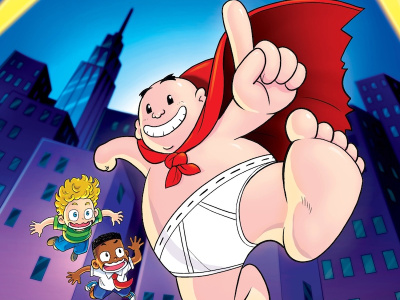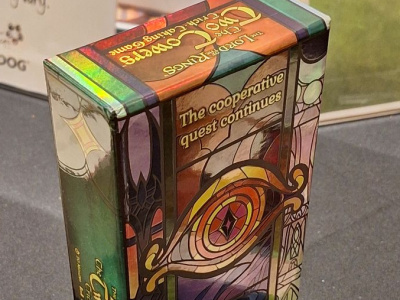
We recently had the opportunity to sit down with Wizards of the Coast CEO Greg Leeds to talk about the state of the industry and what’s happening at the company. In Part 2, we talk about the Kaijudo launch. In Part 1, we talked about the state of the market, the role of retailers, the new direction for Dungeons and Dragons, and what’s going on with product and media licensing of WotC brands. This is the full version of the interview; a partial transcript was published in Internal Correspondence #80.
One of your big launches this year is Kaijudo. Can you talk about the rationale for launching that brand the way you are?
Kaijudo is being positioned in an area in the market where we feel there’s a gap. We believe that there are a lot of 8- to 12-year-olds who want a great competitive game; they want head-to-head play; they want an epic story that they can relate to; and they love good graphics. And for us, that 8- to 12-year-old boy market is not being served, so for Kaijudo we took the best of Duel Masters, added on some global storytelling and artwork philosophies, and created the Kaijudo launch. It goes after what we see as a gap in the market.
Why the differences in how it’s marketed in Japan and here?
From a global standpoint, we think the story is stronger in terms of emphasizing the relationship, the emotional connection that boys have with their creatures in the story. That idea, we feel, is more compelling on a global basis. Some of the basic game play, art and monsters are the same because we know that the gameplay is second to none, but it’s more the superficial storytelling and artwork side. It’s got a more global side to it rather than that specific anime-only look.
You mentioned “from a global standpoint.” Is Kaijudo the brand you’re going to use everywhere except Japan?
Yes, that’s exactly the plan. We’ll keep Duel Masters going in Japan. It’s been very successful there so there’s no need to make any changes in Japan, but outside of Japan Kaijudo will be the brand we take forward.
How are you supporting the launch? Some card games in recent years have been launched and withdrawn in a short period of time, so retailers want to know how this is going to be supported and what your timeframe is for determining the success of the game.
The Kaijudo brand is going to be supported with the methods and tools that we know work in this industry. I won’t try to compare it other brands but I will say that we know boys today want to engage with brands with television—that’s a really important foundation. In addition to that they want to engage with the brand in a digital way and that’s what we’ve done with the Kaijudo brand in terms of taking it to the market.
I’ll talk about retail in a minute, but first on the digital side, we’ve got three digital expressions of the brand designed to engage the boy at different levels, and these digital expressions are available on all platforms. A boy can play at the Battle Game, which is a very simple version of Kaijudo, on his PC or he can play it as a mobile app. That introduces him to the brand.
Then you can go to Kaijudo Online, which is a more in-depth, strategic version of Kaijudo that gets the boy trained in the strategy of how to compete playing Kaijudo.
And then we have a simple app that’s based on katas, which are martial arts maneuvers that boys try to mimic using a touch screen on an iPad or on an iPhone, and that also engages him in the brand in another way.
The combination of the television and the digital marketing tools we know (in fact it’s already starting to happen) will get those boys in there and start the viral nature of a game like Kaijudo. It starts with a few and then expands and expands.
One of the things you‘ve done successfully with Magic is creating the connections between the paper game and the digital game. Is there anything you’re doing in that regard with Kaijudo?
Yes, the great thing about the digital-paper business is that they’re completely connected. Specifically with Kaijudo there are desirable codes that come with the paper product that boys will want to collect to enhance their online experience. Once they get more online experience, we know from our Magic results that we can send the kids back into the stores to play in-store events.
One thing I would emphasize to retailer on Kaijudo is that some retailers are almost waiting on the sidelines for Kaijudo to take off and then they plan to jump in and get in on the business. I would say it would be really unfortunate to take that strategy and then find out someone else in the community has created this great location and destination for Kaijudo. We have launched Kaijudo exclusively in hobby shops to give the hobby retailing industry a head start, an opportunity to establish with their fan base and young people in their local area this affiliation with the brand. I would emphasize to retailers to really get ahead of this and not wait to see what happens.
You started in the hobby and then put it into mass. Do you have a feel for how this is going to play out in terms of the roles of the two channels for this game (because it’s a significantly different target audience than Magic)?
We think it will be strong in both channels. Our experience with Magic: The Gathering tells us that the hobby stores will have vibrant communities where kids come to play, play in in-store events, have that in-store experience that our game can provide, and mass will still be strong because there will be a convenience element to picking up their Kaijudo cards while their parents are doing other types of shopping. For us, we see both channels as vital and we know that we can be successful and meet the needs of retailers in both channels.
What about the target age? Kaijudo is younger which is historically considered more of a mass audience than a hobby audience.
That’s a good point. Historically you would think that you would associate younger kids with mass market retailers, but as mentioned earlier, as stores change and become more welcoming, more clean, more inviting to a wider variety of people, I think hobby shops will be very successful attracting younger people. We see them as we travel around the country –stores that have built up very strong audiences of young players and those stores also know they can tap into their older customers’ kids. The older customers who are loyal to hobby shops are looking for wholesome, intellectually stimulating, interesting ways for their kids to spend their leisure time. I think that’s where that need comes in: there aren’t’ enough of those opportunities in our industry and Kaijudo will fill that gap.







